Australian senator sponsors Iranian labor activist on death row
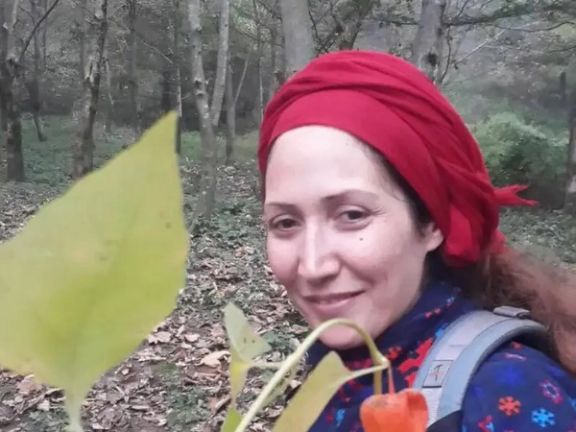
Australian Greens Leader in the Senate Larissa Waters has taken political sponsorship of Iranian labor activist Sharifeh Mohammadi, who has been sentenced to death.

Australian Greens Leader in the Senate Larissa Waters has taken political sponsorship of Iranian labor activist Sharifeh Mohammadi, who has been sentenced to death.
In a letter addressed to the Embassy of the Islamic Republic of Iran in Australia, Waters expressed deep concern over reports indicating that since Mohammadi's imprisonment in December 2023, she has been subjected to physical and mental torture, endured months of solitary confinement, and has been denied visits from her family, including her young son.
The death sentence for Mohammadi, a labor activist imprisoned in Iran on trumped-up charges of armed rebellion, has sparked widespread condemnation from activists. They maintain that the sentence is based on the pretext of her membership in an independent, public, and legal labor organization from a decade ago, highlighting the perceived unfairness of the verdict.
In her letter, Waters requested an urgent update on Mohammadi's welfare and case status and added that it is critical that Mohammadi is "granted an unbiased trial and that the death sentence is overturned immediately."
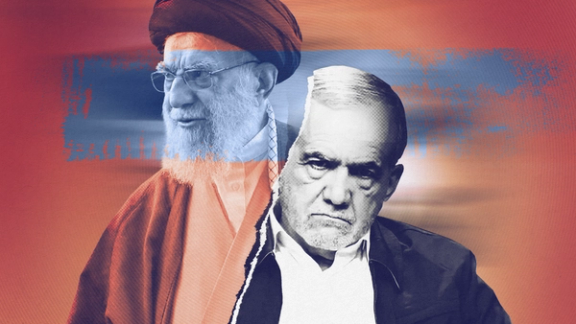
An IRGC-linked newspaper has criticized President Masoud Pezeshkian for the "consequences" of his repeated statements that Supreme Leader Ali Khamenei will be heavily involved in the appointment of his cabinet.
Pezeshkian, who is expected to present his cabinet to Parliament for a vote of confidence in the coming days, possibly on Sunday, has, along with his newly appointed parliamentary liaison Shahram Dabiri, emphasized that he will consult with Khamenei and secure his “approval” for the nominees before submitting them to Parliament.
Pezeshkian has consistently emphasized that his policies will be shaped by the overarching directives set by Khamenei. He also insists that his administration’s performance should be judged on how closely officials adhere to these guidelines and how effectively they utilize the resources at their disposal.
However, an editorial note in Javan newspaper Wednesday said that Pezeshkian's statements about getting Khamenei's approval “can provide excuses to certain people to avoid bearing responsibility for ministers’ performance” and to shift “responsibility and [need for] accountability” to Khamenei.
It has long been understood that no president can form a government without Khamenei's approval of individual candidates. However, Pezeshkian has taken an unprecedented step by openly emphasizing this reality, making it clear that Khamenei also shares responsibility for the administration's performance. This tactic sets him apart from his predecessors, who typically kept such matters behind closed doors.
“Such an approach, obviously, cannot be right neither politically nor ethically,” the Javan editorial charged. It also maintained that Khamenei does not get involved in “executive affairs” or “interfere in other entities’ activities” claiming that he even avoids interfering when directly requested to express his opinion.
Similar accusations are widely made by hardliners and ultra-hardliners on social media against Pezeshkian and his right-hand man, Mohammad-Javad Zarif, who he appointed to the newly created position of ‘strategic deputy’ last week to the huge disappointment of his critics.
“No president’s cabinet should be evaluated on the basis of the approval or disapproval of the Leader of the Revolution,” the Javan editorial argued while stressing that the responsibility for the performance of government officials only lies with the president.
“Opposition to and criticism of no minister can be taken as opposing the Leader,” Javan wrote referring to the very high possibility of strong opposition of the hardliner-dominated parliament in the review process of some of Pezeshkian’s proposed candidates.
However, while tightly controlling the core of the regime, Khamenei usually pretends he is not involved in the decisions and actions of the executive branch and tries to avoid responsibility for failures.
“We are certain that appointment to these positions will not be possible without consultation with the Supreme Leader,” Alaeddin Boroujerdi, a veteran conservative lawmaker and former head of the Parliament’s National Security and Foreign Policy Committee, said last week.
Pezeshkian is the first Iranian president to inform the public of such a step in the formation of the cabinet and to say he would discuss not only candidates for these five positions but also all others with Khamenei.
Javan’s editorial also referred to “some pessimists” who believe that Pezeshkian’s parliamentary deputy highlighted the Leader’s involvement in the selection of the ministers to put pressure on the Parliament and limit lawmakers’ independence.
Pundits say highlighting Khamenei’s role in setting guidelines for the government and shedding light on his deep involvement in the selection of its officials is indeed a step towards transparency and would allow the president to be held only responsible for what he has freely and independently chosen to do.
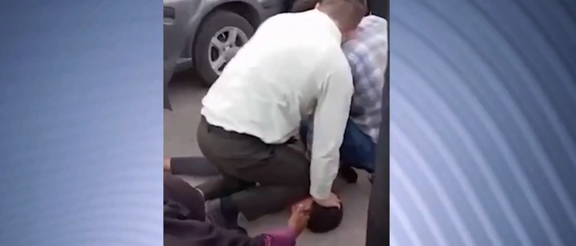
A 15-year-old Afghan has sustained severe injuries including a broken neck after Iranian police knelt on his neck amid escalating efforts to expel a growing number of Afghan immigrants.
According to Afghanistan International, Seyed Mehdi, who suffers from partial hearing problems, was fleeing from the police as they launched a series of attacks on migrants in a village in Damavand country in Tehran.
In a video of the incident, verified by Afghanistan International, two plainclothes officers and one uniformed officer are seen pinning the teenage to the ground next to a police vehicle.
Initially, two officers are seen applying their total weight on the boy's body, with one subsequently placing his knee on his neck, in scenes echoing the death of George Floyd in the US in the hands of police. The teenager is seen crying out in pain with several nearby women screaming and attempting to intervene, but the security officers stop them.
The video depicts that after some time, Seyed Mehdi's cries fall silent, and the officers then drag him into the police vehicle.
According to Afghanistan International, the teenager is currently hospitalized, though his exact condition remains unknown.
Analysts have noted the irony that in 2020, Iran's Supreme Leader Ali Khamenei condemned the murder of George Floyd as evidence of the "true nature" of American leadership, yet he is silent regarding similar actions perpetrated by Iranian police.
"The crime committed against this black man is the same thing the US government has been doing against all the world," Khamenei said in televised speech. "This is the US government's true nature and character that is being exposed today."
In recent weeks, the intensity of pressure exerted by Iranian security forces and certain segments of the Iranian populace on immigrants has markedly escalated, accompanied by a surge in reported incidents of aggression.
On Wednesday, Iran Police Chief Ahmadreza Radan said all illegal immigrants must leave the country and return home by the end of the current Iranian year (March 20, 2025).
Meanwhile, the governor of Shahriar in Tehran Province announced a "rapid action plan for arresting illegal immigrants." Alireza Fatehi-Nejad said on Wednesday that undocumented Afghans will be returned to their country under the plan.
Also on Wednesday, Hamidullah Fitrat, the deputy spokesperson for the Taliban, announced the expatriation of 4,000 Afghan prisoners from Iranian prisons back to Afghanistan.
Furthermore, the IRGC-affiliated Tasnim News Agency reported in March that a comprehensive police initiative had been launched to apprehend and repatriate unauthorized immigrants from Tehran Province.
Additionally, it was announced that a "special patrol" has been established in Shahr-e Rey, south of Tehran, specifically tasked with identifying and detaining illegal foreign nationals.
Afghans represent the predominant group among both legal and undocumented immigrants in Iran, often referred to as "foreign nationals" by government authorities and media outlets. Official estimates suggest that the Afghan immigrant population in Iran could be as substantial as eight million.
International human rights organizations have meticulously documented years of systemic mistreatment faced by Afghan refugees and migrants in Iran, highlighting their persistent deprivation of essential services such as healthcare, employment opportunities, and housing.
The substantial influx of Afghan refugees following the Taliban's takeover in 2021 has exacerbated these issues, provoking a backlash from some Iranians who argue that their country is already grappling with severe economic and social crises and is ill-equipped to accommodate additional refugees.
According to Afghan authorities, Iran deported over 20,000 Afghan children last year, many of whom were unaccompanied and without guardians.
Last week, Iranian authorities expelled Kobra Gholami, an outspoken Afghan social researcher, allegedly for failing to comply with the country's mandatory hijab regulations.
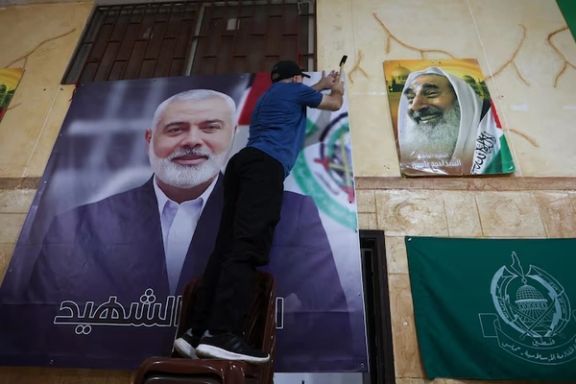
Iran’s military retaliation against Israel for the assassination of Hamas leader Ismail Haniyeh in Tehran is taking longer than expected, US intelligence sources say.
While initial assessments had predicted an early attack this week, the latest information says any retaliation may now be postponed, reported Al Arabiya.
It is believed that Iran waited until after Wednesday’s meeting of the Organization of Islamic Cooperation (OIC) in Jeddah before taking any action.
Iran’s Acting Foreign Minister Ali Bagheri-Kani traveled Jeddah, Saudi Arabia, leading a delegation to attend an extraordinary meeting of the Executive Committee of Foreign Ministers of the OIC. The meeting discussed the implications of the assassination of Hamas leader Ismail Haniyeh in Tehran last week.
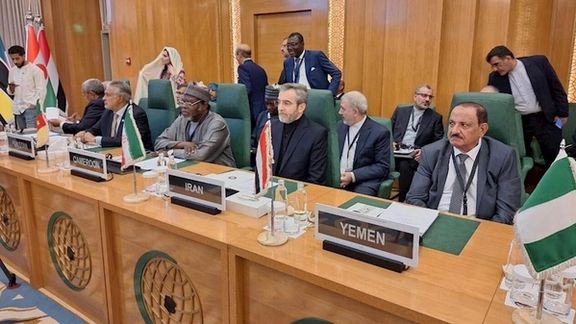
Kani called on Muslim countries to support Iran's right to defend itself against "acts of aggression". Saudi Arabia supported Iran's position, saying the assassination was a "blatant violation" of Iran's sovereignty.
Iran has blamed Israel and the US for the killing of Haniyeh and has vowed to "avenge" his blood, however, the delay in retaliation has raised questions. White House officials said Tuesday that they believe President Joe Biden’s efforts to prevent a war in the Middle East "may be paying off" and "Iran may be reconsidering a plan for major retaliation" following the killing of the Hamas chief in Tehran, according to the Washington Post.
"The Iranian response has been complicated by seeming confusion over the circumstances of Haniyeh’s death. Tehran at first claimed he was killed by an Israeli missile, requiring a similar Iranian response. But officials say that Tehran has concluded privately that he was instead eliminated by a concealed bomb, perhaps prompting a different response," read the article.
Tehran may also be dissuaded by the US show of force this week, and secret White House communications passed via the Swiss embassy in Tehran and the Iranian mission at the United Nations, the report said.
“Iran understands clearly that the US is unwavering in its defense of our interests, our partners and our people. We have moved a significant amount of military assets to the region to underscore that principle,” a senior administration official told The Washington Post’s David Ignatius.
In another development, German airline giant Lufthansa announced on Wednesday that it will avoid using Iranian and Iraqi airspace until August 13, extending its earlier decision due to high tensions in the Middle East. In addition to this, Lufthansa has extended the suspension of its services to Tel Aviv, Tehran, Beirut, Amman, and Erbil until the same date.

Regional and international reactions
Egypt's Foreign Minister Badr Abdel-Aty expressed concerns about regional stability in a phone call with Bagheri-Kani. Egypt has instructed all its aircraft to avoid Iran's airspace for a three-hour period early Thursday, amid fears of an Iranian retaliatory strike against Israel.
The United States and Australia have denounced Iran's destabilizing behavior, including its support for armed proxies and militant partners. US Secretary of State Antony Blinken and Secretary of Defense Lloyd J. Austin III, along with Australian counterparts, condemned threats to shipping and freedom of navigation in the Persian Gulf, Red Sea, and Gulf of Aden, stressing the need to defend navigational rights and freedoms.
Swiss Foreign Minister Ignazio Cassis also highlighted Switzerland’s dedication to prioritizing restraint during a phone call with Bagheri-Kani, emphasizing the need for moderation and diplomacy.
Israeli perspectives
Israeli Foreign Minister Israel Katz emphasized that the election of Yahya Sinwar as the leader of Hamas signals that the Palestinian issue is now significantly controlled by Iran and Hamas. Katz warned of the consequences of Israel withdrawing its military presence in Gaza, noting the regional threats posed by Iran. He proposed a solution of Palestinian self-management in Judea and Samaria, with Israel maintaining control over security and foreign affairs to prevent another Iranian stronghold.
Defense Minister Yoav Gallant warned Hezbollah that further escalation could lead to substantial damage to Lebanon. "As things stand, Nasrallah could lead Lebanon to pay a very, very heavy price. They can't imagine what could happen," he told Israeli troops. Gallant discussed threats posed by Iran and its proxies with his German counterpart Boris Pistorius, calling for global unity against Iran.
This comes as a Hezbollah commander responsible for anti-tank guided missile fire on northern Israel was killed in an air strike earlier Wednesday, according to the IDF. Hassan Fares Jeshi was killed in southern Lebanon, with Israeli fighter jets also striking Hezbollah buildings in Aitaroun.
Iran's stance
Despite the lack of immediate action, Iranian officials continue to keep their rhetoric strong. President Masoud Pezeshkian accused Israel of inciting conflict through its “criminal and terrorist actions in Gaza and the assassination of Ismail Haniyeh” during a phone call with French President Emmanuel Macron on Wednesday. He criticized the US and Western countries for “supporting these actions instead of condemning them,” stating they have aided in “committing crimes, genocide, and terrorism.” Pezeshkian urged for a ceasefire, emphasizing that Iran is committed to peace and the defense of its interests under international law.
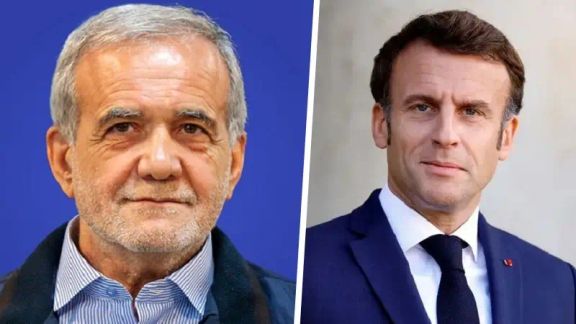
Iranian army commander Abdolrahim Mousavi on Wednesday issued a warning to Israel, asserting that their actions will not go unanswered. "These crimes and assassinations by the Zionist regime will not go unanswered and will receive a definite and decisive response," he said.
In a phone conversation with British Foreign Secretary David Lammy, Bagheri-Kani also criticized European countries for their passive stance on Haniyeh's assassination, holding the US, UK, and France responsible for what he described as the actions of the sole “malevolent entity” in the region.
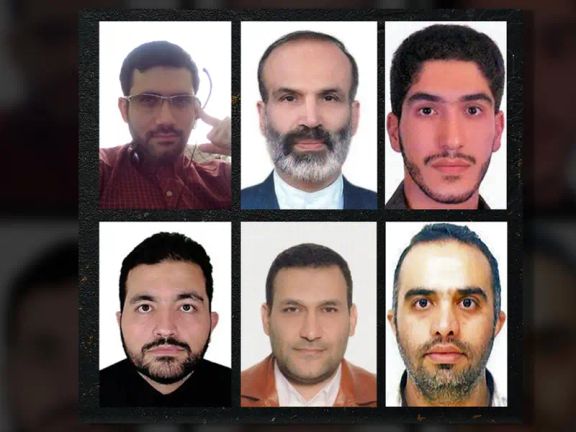
The US has offered a $10m reward for information on six identified Iranian government hackers responsible for a series of cyberattacks on US water utilities last fall.
The State Department statement said it is looking for "information leading to the identification or location" of the suspects.
The six Iranian officials named in the advisory are linked to Iran’s Islamic Revolutionary Guard Corps (IRGC) and its Cyber-Electronic Command (IRGC-CEC).
They are accused of compromising industrial control systems, specifically targeting the Vision series of programmable logic controllers (PLCs) manufactured by Israel-based Unitronics. These PLCs are widely used in various industries, including water and wastewater, energy, food and beverage, manufacturing, and healthcare.
The men identified include Hamid Reza Lashgarian. head of the IRGC’s cyber-electronic command and a commander in the IRGC-Qods Force.
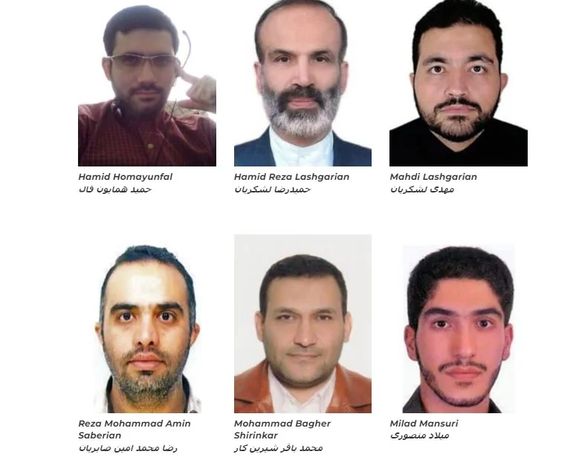
The officials have been linked to the hacking group CyberAv3ngers. In October, CyberAv3ngers publicly took credit for cyberattacks against Israeli PLCs, and starting in November, they compromised the default credentials in these PLCs across the US, leaving messages on the devices’ digital screens with anti-Israel statements. These compromises often rendered the devices inoperative.
On February 2, the US imposed sanctions on the same six individuals for their “deliberate targeting of critical infrastructure.” A Treasury Department official condemned the attacks as “unconscionable and dangerous,” emphasizing that the US “will not tolerate such actions and will use the full range of our tools and authorities to hold the perpetrators to account.”
The IRGC-CEC was previously sanctioned by the US in 2018 and designated a terror group in 2019.
The individuals were named as Specially Designated Nationals under Executive Order (E.O.) 13224, which targets leaders and officials of terrorist organizations.
The sanctions block all property and interests in property of the designated officials within the US or controlled by US citizens and generally prohibit US citizens from engaging in transactions with them.
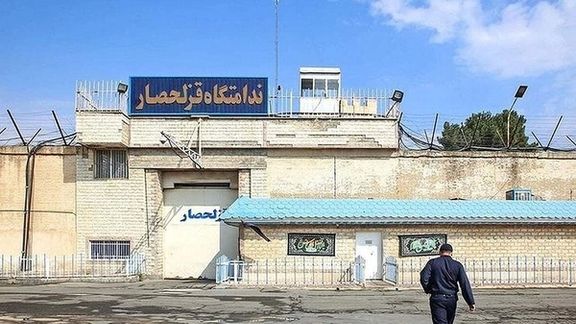
Irani carried out a mass execution of at least 29 people on Wednesday morning in two prisons located near the capital, Tehran, as the world was busy following news of a possible attack on Israel.
Twenty-six prisoners were executed in Ghezelhesar Prison and three were executed in Karaj Central Prison, according to Norway-based Iran Human Rights Organization (HRNGO).
"The Islamic Republic, by exploiting global attention on its tension with Israel, is currently engaged in mass killing prisoners and intensifying the suppression in Iran,” said HRNGO director, Mahmood Amiry-Moghaddam in a statement on Wednesday.
Of the 29 men executed, 17 were executed for murder charges, seven were on death row for drug-related charges and three on rape charges.
HRNGO also reported that the rights group had received reports of an additional two women being executed on Wednesday but was unable to confirm the report so far.
HRNGO further noted that at least 87 people have been executed in Iran in one month since the presidential elections on July 6. This brings the total number of those executed in 2024 to 338 as of Wednesday.
According to Amnesty International, Iran carried out 853 executions in 2023, marking the highest number in eight years. Amnesty International noted that 64 percent of the executions in 2023 were for crimes that did not warrant the death penalty under international law, including drug-related offences, robbery, and espionage.
Since the alleged Israeli assassination of Hamas's political leader, Ismail Haniyeh, in Tehran last week, Iran has threatened to retaliate. Global powers have been intervening to calm tensions as fears rise of an escalation between the two archenemies.
In April, Iran launched its first-ever direct attack on Israel, launching a barrage of 350 missiles, rockets and drones, most of which were intercepted by Israel and a US-led coalition.
However, the threats from Tehran say this retaliatory attack would be far worse, while countries such as the US and Russia have been urging calm.